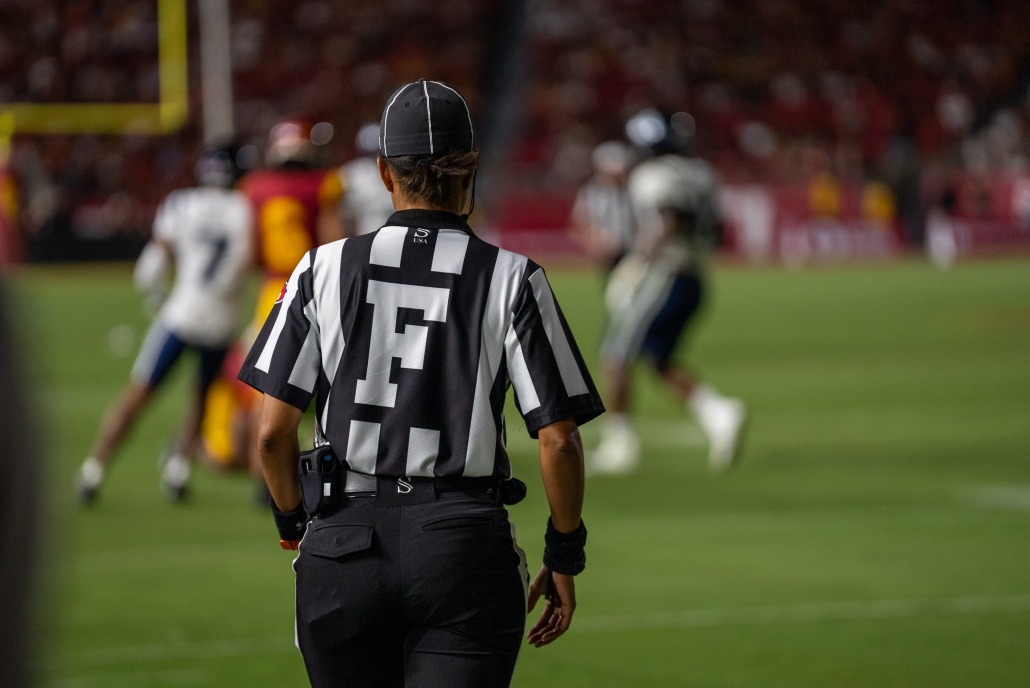LITTLE THINGS
Heatwaves, shadowy taves and mini-delays
In sports, the small things are significant, especially when you can’t see them.
In sports, the small things are significant, especially when you can’t see them.


“Little things make big things happen,” is an all-time classic morsel of wisdom from former UCLA men’s basketball Head Coach John Wooden.
Although Wooden’s wizardry worked on behalf of the Bruins, there is truth to his thoughts. In life, so much is determined by one thing, whereas in sports, that is rarely the case. Sure, a game can be distilled to a highlight reel, but in reality, a volume of parallel actions determines the final scoreline rather than spurts of brilliance or moments of disarray.
Sports are a compilation of small movements like a perfectly timed juke, an extra step up in the pocket or the selection of a kick serve. And anything can detract from the focus of these movements, such as fearing the shame of marring a play, musing over the heroics of a catch, remembering someone you love or even the outstretched hands of Steve Bartman.
But ultimately, outcomes in sports are weighted summations, it is the totality of these moments that matter.
Consider Game 1 of the 2018 NBA Finals. The Cavaliers faced an All-Star lineup in the Warriors’ Kevin Durant, Stephen Curry, Klay Thompson and Draymond Green, yet somehow, Cleveland found itself tied at then-Oracle Arena with five seconds remaining. When the clock resumed, J.R. Smith collected an offensive rebound, and unaware of the score, he dribbled the ball as time ran out.
The gassed Cavs went on to lose that game by 10 points in overtime, and Smith is often credited with “costing” Cleveland the game and the series sweep to follow. However, even with Smith’s gaffe, the Cavs had the chance to chase a chip in each of the series’ four games.
On the opposing extremity, think back to the 2017 Super Bowl when Tom Brady tossed an 82-yard pick-six, placing the Patriots in an early 21-0 hole. Even with that abysmal moment and those preceding it, Brady and the Pats erased a 25-point deficit for their fifth ring.
Based on this belief, the tag “Little Things” will be an attempt to honor what’s minutely meaningful in USC Athletics. So, in the spirit of addressing what is not always seen, let’s talk about blackouts.
On Saturday night, No. 11 USC football (2-0) was electric in its home opener. The Trojans delivered Utah State a 48-0 tave, but even though the game was decided early, it still dragged on deep into the night.
An ongoing heat wave in South Central strained power grids all weekend, and with 10:12 to go in the fourth quarter, a power outage struck the Los Angeles Memorial Coliseum. As shadows skulked in patches across the stadium, the game came to a full stop.
Fans formerly submerged in the action on the field retracted their focus to their surroundings in the stands. With the chassis of the match cleaved, fans had to construct trust among one another that was once invested in the game’s structure. To pass the time until the games’ uncertain resume, they basked in the intimacy of darkness, waving camera lights and chatting with their neighbors, building new forms of solidarity beyond the field.
These 10 minutes reminded me of my beloved Tropicana Field — home of the Tampa Bay Rays — in South Florida. The Trop is notorious for being the undisputed “worst” stadium in baseball — it is a giant circus dome with stingray touch tanks, obsolete advertisements and zero fans.
During the summers, my family and I snagged $7.11 tickets each Friday and trudged up the coast for ball games. And in typical Trop fashion, my visits were not defined by wins but rather by whether or not the lights had gone out. The brief suspensions of sight were expected and exhilarating; the energy once used to charge the halides meandered its way into the crowd and revealed itself in the form of song, chatter and swaying flashlights.
I love the Trop. I have always been drawn to used and defective things. In fact, I find new and sanitized things to be stressful and sometimes repulsive. I suspect it is because there is comfort in use; it serves as a chronicling of time, signifying that all of this has been done before. There is also comfort in familiarity. Like the Trop, I have been used, at least since the beginning of my time, and sometimes my lights turn off.
So yes, I demarcate Rays games by blackouts. The Coliseum is probably not well-suited to that filing format, but for some fans Saturday, I’m sure they too will remember the moment they partook in the comradery of sport via a shared anticipation for the game’s resume. Or perhaps for some, those actionless minutes were like the rest of the game — coaches and players stood on the field but in their eyes, nothing was happening.
Leila MacKenzie is a junior writing about small things in sports in her column, “Little Things,” which runs every other Tuesday. She is also a sports editor at the Daily Trojan.
We are the only independent newspaper here at USC, run at every level by students. That means we aren’t tied down by any other interests but those of readers like you: the students, faculty, staff and South Central residents that together make up the USC community.
Independence is a double-edged sword: We have a unique lens into the University’s actions and policies, and can hold powerful figures accountable when others cannot. But that also means our budget is severely limited. We’re already spread thin as we compensate the writers, photographers, artists, designers and editors whose incredible work you see in our daily paper; as we work to revamp and expand our digital presence, we now have additional staff making podcasts, videos, webpages, our first ever magazine and social media content, who are at risk of being unable to receive the support they deserve.
We are therefore indebted to readers like you, who, by supporting us, help keep our paper daily (we are the only remaining college paper on the West Coast that prints every single weekday), independent, free and widely accessible.
Please consider supporting us. Even $1 goes a long way in supporting our work; if you are able, you can also support us with monthly, or even annual, donations. Thank you.
This site uses cookies. By continuing to browse the site, you are agreeing to our use of cookies.
Accept settingsDo Not AcceptWe may request cookies to be set on your device. We use cookies to let us know when you visit our websites, how you interact with us, to enrich your user experience, and to customize your relationship with our website.
Click on the different category headings to find out more. You can also change some of your preferences. Note that blocking some types of cookies may impact your experience on our websites and the services we are able to offer.
These cookies are strictly necessary to provide you with services available through our website and to use some of its features.
Because these cookies are strictly necessary to deliver the website, refusing them will have impact how our site functions. You always can block or delete cookies by changing your browser settings and force blocking all cookies on this website. But this will always prompt you to accept/refuse cookies when revisiting our site.
We fully respect if you want to refuse cookies but to avoid asking you again and again kindly allow us to store a cookie for that. You are free to opt out any time or opt in for other cookies to get a better experience. If you refuse cookies we will remove all set cookies in our domain.
We provide you with a list of stored cookies on your computer in our domain so you can check what we stored. Due to security reasons we are not able to show or modify cookies from other domains. You can check these in your browser security settings.
These cookies collect information that is used either in aggregate form to help us understand how our website is being used or how effective our marketing campaigns are, or to help us customize our website and application for you in order to enhance your experience.
If you do not want that we track your visit to our site you can disable tracking in your browser here:
We also use different external services like Google Webfonts, Google Maps, and external Video providers. Since these providers may collect personal data like your IP address we allow you to block them here. Please be aware that this might heavily reduce the functionality and appearance of our site. Changes will take effect once you reload the page.
Google Webfont Settings:
Google Map Settings:
Google reCaptcha Settings:
Vimeo and Youtube video embeds:
The following cookies are also needed - You can choose if you want to allow them:
